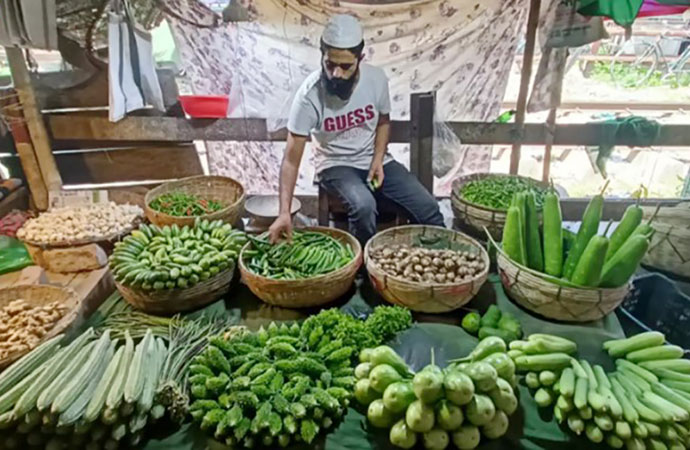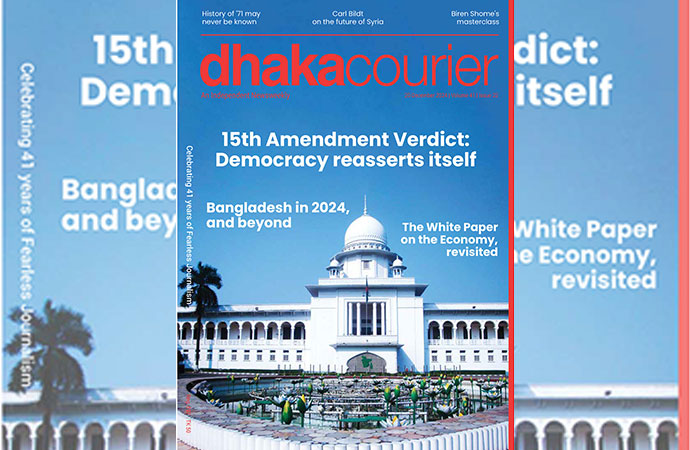Column

Photo: UNB
As Bangladesh prepares for 2025, it is crucial to maintain a balanced approach, prioritising market regulation, law enforcement and export expansion to secure continuous economic growth. Strengthening market regulation is expected to help curb inflation and ensure fair competition, while improving law and order can enhance investors' confidence and create a secure environment for businesses.
Expanding exports, particularly in textiles, pharmaceuticals and technology, will be keys to diversifying the economy and reducing dependency on domestic consumption. By prioritising these areas, Bangladesh can pave a smoother path for prosperity, boosting both national stability and global trade standing.
Breaking Syndicates
Bangladesh is at a critical juncture in its history, struggling with mounting political instability, economic turbulence and the growing power of market syndicates. These syndicates, a group of traders manipulating markets for their benefit, have become a significant obstacle to economic stability.
The unchecked activities of these groups have led to inflated prices, poor supply chain management and a soaring cost of living. For Bangladesh to secure a more prosperous future, dismantling these syndicates must be a top priority for the interim government.
Originally referring to a legitimate group with a common purpose, a market syndicate in Bangladesh now describes powerful factions controlling key sectors like poultry, oil, onions and medicine. These syndicates often manipulate the supply of goods to engineer artificial shortages, allowing them to inflate prices. Consequently, consumers are left with little choice but to pay significantly higher prices for essential products.
Addressing the problem of market syndicates cannot be done in isolation. The interim government must prioritise a comprehensive approach that tackles the breakdown of law and order while dismantling these monopolies. Strengthening law enforcement, improving regulatory oversight and instilling greater transparency in markets will ensure a more balanced economic environment.
Political Instability Impact
One of the root causes of syndicate proliferation in Bangladesh is the breakdown of law and order. Political instability has undermined the country's ability to effectively regulate markets. With law enforcement distracted by political unrest, criminal activity and extortion, market syndicates operate unchecked.
In this lawless environment, traders can stockpile goods, manipulate supply chains, and impose illegal tolls, all without fear of repercussions. Ultimately, citizens bear the brunt of these manipulations, facing higher prices for essential goods.
The country's poor infrastructure also contributes to market distortions. Delays in transportation, coupled with syndicate control over key distribution points, exacerbate the problem. Chief Adviser Prof Muhammad Yunus has called for urgent action to curb extortion in the supply chain, warning that these practices are destabilising market prices and eroding consumer trust.
Ramadan Challenges
During Ramadan, set to begin in March next, Bangladesh faces major challenges in controlling food prices due to a surge in demand for essentials like beef, dates and vegetables. The fasting period leads to higher consumption, particularly for iftar and sehri meals, which puts pressure on the supply chain.
This increased demand often drives up prices, especially for items that are considered staples during the month. The price of beef, for example, has risen by 350% over the past 15 years, highlighting the strain that inflation puts on the market.
A major factor contributing to the price hikes is the influence of market syndicates, which exploit the situation by hoarding goods and creating artificial shortages. These groups manipulate prices, taking advantage of the high demand and low supply during Ramadan. Despite attempts by the government to regulate the market through price caps and releasing stocks, enforcement remains weak, allowing these syndicates to continue their practices unchecked.
Bangladesh's supply chains are often inefficient, exacerbating the issue. Problems like poor infrastructure, transportation delays, and fluctuations in production can disrupt the timely delivery of goods to markets, leading to shortages and higher prices. Imported goods, such as dates, are also subject to global supply chain disruptions, further driving up costs. As a result, consumers bear the brunt of these price shocks, particularly during Ramadan when demand is at its peak.
Consequences of Inflation
The devastating effects of syndicate control on inflation are palpable across the country. As import costs rise and syndicates manipulate domestic markets, essential goods become increasingly unaffordable, especially for low-income households.
Despite Bangladesh's consistent GDP growth of 6.4% annually from 2010 to 2023, the current economic situation presents a stark contrast. Growth has slowed, the currency has devalued, and debt levels have escalated, creating a perfect storm of economic challenges.
To combat inflation, breaking the power of syndicates is essential. Efforts should include lowering interest rates, easing restrictions on imports, and improving supply chain efficiency. Long-term, systemic reforms aimed at increasing accountability and transparencies across the economy are critical to ensuring the stability of prices.
Shrinking Export Sector
While domestic issues dominate headlines, Bangladesh's export sector is also facing mounting challenges. The ready-made garment (RMG) industry, a vital part of the economy, has seen a sharp decline in exports in 2024, falling by 4.34% year-on-year. Key hurdles include disruptions caused by syndicate control over supply chains, rising energy costs, and global economic downturns that have reduced demand from international buyers.
Revitalising the export sector requires a focus on diversification, infrastructure development, and modernisation. Breaking the monopolistic control of syndicates in supply chains will be crucial to increasing competitiveness and securing Bangladesh's place in the global market.
Foreign Exchange Reserves and Hundi Market
Bangladesh's foreign exchange reserves have taken a significant hit, falling from a high of $48 billion in 2021 to just $20 billion by late 2024 for many reasons, including widespread corruption during the previous regime. Though the situation is improving, this decline has left the country vulnerable to external shocks. Restoring reserves will require both a boost in export earnings and the formalisation of remittance channels.
The informal hundi market, which facilitates an estimated $38 billion in remittances, undermines the formal financial system. Strengthening regulations and providing incentives for formal remittance systems will be critical to closing this gap.
To achieve economic stability and growth, Bangladesh must restore law and order, break the control of market syndicates, and implement policies focused on long-term progress. The interim government needs to strengthen law enforcement to eliminate syndicates and create a safer business environment.
It should also introduce stricter regulations to stop price manipulation and illegal market practices. Boosting exports through diversification, better infrastructure, and modernised industries is essential. The government should also encourage the use of official remittance channels to reduce dependence on informal systems.
Bangladesh has always demonstrated resilience in the face of adversities. By addressing the twin challenges of political instability and economic manipulation, the country can lay the foundation for a stable and prosperous future. The time for change is now.

























Leave a Comment
Recent Posts
Banglar Jishu
Merry Christmas! I mean it. Here’s why. Nirendranath Chakr ...
2024: A Year of Historic Recko ...
As 2024 comes to a close, we can only reflect on the second chance at ...
China reaffirms continued support for Bangladesh's d ..
‘Have so many things to offer each other’: Pranay Ve ..
Accurate, balanced diplomatic reporting to stop misi ..
Pakistani airstrikes in eastern Afghanistan killed 4 ..